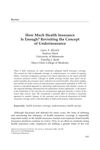 42 citations,
January 2019 in “Frontiers in Immunology”
42 citations,
January 2019 in “Frontiers in Immunology” A blood pressure drug, diltiazem, may also help treat influenza.
 2 citations,
February 2014 in “Hair therapy & transplantation”
2 citations,
February 2014 in “Hair therapy & transplantation” Alopecia Areata is an autoimmune condition causing hair loss, influenced by genetics, environment, and possibly improved by anti-MIF therapy, with many patients experiencing regrowth within a year.
 February 2019 in “Journal of the Faculty of Agriculture Kyushu University”
February 2019 in “Journal of the Faculty of Agriculture Kyushu University” Terpene concentrations in coniferous trees are highest in spring and summer, making these seasons best for extracting essential oils.
 13 citations,
July 2019 in “Pediatric dermatology”
13 citations,
July 2019 in “Pediatric dermatology” Pediatric dermatologists need to understand the unique skin health needs of LGBTQIA youth to provide better care.
 47 citations,
July 2014 in “European Journal of Pharmaceutics and Biopharmaceutics”
47 citations,
July 2014 in “European Journal of Pharmaceutics and Biopharmaceutics” Scientists created a gel with nanoparticles to deliver medicine to hair follicles effectively.
 33 citations,
November 2019 in “Journal of Controlled Release”
33 citations,
November 2019 in “Journal of Controlled Release” Microneedles with enhancer effectively promote hair growth and increase hair density.
 1 citations,
October 1996 in “Journal of Cutaneous Medicine and Surgery”
1 citations,
October 1996 in “Journal of Cutaneous Medicine and Surgery” Gene therapy shows promise for treating skin disorders and cancer, but faces technical challenges.
 1 citations,
May 2018 in “The journal of investigative dermatology/Journal of investigative dermatology”
1 citations,
May 2018 in “The journal of investigative dermatology/Journal of investigative dermatology” The symposium highlighted the importance of understanding disease mechanisms for targeted dermatology treatments.
 86 citations,
August 2021 in “Polymers”
86 citations,
August 2021 in “Polymers” Microneedles are effective for drug delivery, vaccinations, fluid extraction, and treating hair loss, with advancements in manufacturing like 3D printing.
 11 citations,
November 2021 in “BMJ Open”
11 citations,
November 2021 in “BMJ Open” People with alopecia areata have higher rates of mental health issues, autoimmune diseases, and infections.
 August 2024 in “International Journal of Medicine”
August 2024 in “International Journal of Medicine” COVID-19 can cause hair loss, and managing it involves counseling, diet changes, and treatments.
 1 citations,
November 2022 in “Pharmaceutical research”
1 citations,
November 2022 in “Pharmaceutical research” The simulation showed that hypobaric pressure improves drug delivery through the skin, but stretching alone doesn't fully explain the increase.
 4 citations,
June 2006 in “Primary Care”
4 citations,
June 2006 in “Primary Care” The document recommends a team-based approach and personalized care for managing diabetes in teenagers.
 2 citations,
May 2018 in “Expert opinion on orphan drugs”
2 citations,
May 2018 in “Expert opinion on orphan drugs” Newborn screening and gene therapy are expected to improve outcomes for Omenn syndrome patients.
 36 citations,
November 2006 in “Medical Care Research and Review”
36 citations,
November 2006 in “Medical Care Research and Review” The document concludes that there is no clear definition of adequate health insurance, and a consistent method to measure underinsurance is needed.
 245 citations,
January 2018 in “Bone Research”
245 citations,
January 2018 in “Bone Research” TGF-β is crucial for tissue repair and can cause diseases if not properly regulated.
 11 citations,
December 2014 in “Clinical Obstetrics and Gynecology”
11 citations,
December 2014 in “Clinical Obstetrics and Gynecology” Obstetrician/gynecologists can diagnose and manage female hair loss with careful history taking and examination.

Custom skincare can be made based on genes, fewer cats in Lublin have FeLV/FIV than national average, and studies also looked at small water bodies, river pollution, guppy growth, toxins in biochars, palm oil issues, and pumpkin seed oil for hair strength.
353 citations,
July 2015 in “Molecular immunology” Porcine skin is very similar to human skin, making it a useful model for research.
 1 citations,
June 2020 in “bioRxiv (Cold Spring Harbor Laboratory)”
1 citations,
June 2020 in “bioRxiv (Cold Spring Harbor Laboratory)” Fetal skin has unique immune cells different from adult skin.
 1 citations,
May 2023 in “International Journal of Applied Pharmaceutics”
1 citations,
May 2023 in “International Journal of Applied Pharmaceutics” Placenta extract in novasomes improved rat hair growth better than minoxidil and placenta extract in liposomes.
 June 2007 in “Journal of The Royal Society for The Promotion of Health”
June 2007 in “Journal of The Royal Society for The Promotion of Health” Smoking doubles the risk of blindness, and physical exercise helps dyslexic children read better.
 123 citations,
May 2020 in “Drug Development Research”
123 citations,
May 2020 in “Drug Development Research” Men's sensitivity to male hormones might affect how severe COVID-19 gets for them.
 222 citations,
October 2014 in “Annual Review of Pharmacology and Toxicology”
222 citations,
October 2014 in “Annual Review of Pharmacology and Toxicology” Eph receptors and ephrins may be promising targets for treating diseases, but more understanding is needed for effective and safe therapies.
 July 2024 in “Dermatology Practical & Conceptual”
July 2024 in “Dermatology Practical & Conceptual” COVID-19-related hair loss may have unique features compared to hair loss from other causes.
July 2011 in “Journal of Pediatric and Adolescent Gynecology” A 15-year-old girl has a skin condition causing blisters on her feet, likely inherited from her family.
 72 citations,
November 2015 in “Multiple Sclerosis and Related Disorders”
72 citations,
November 2015 in “Multiple Sclerosis and Related Disorders” Teriflunomide is safe and tolerable for treating relapsing-remitting multiple sclerosis, with manageable side effects.
 January 2022 in “Sustainable development goals series”
January 2022 in “Sustainable development goals series” The document concludes that significant investment in agricultural innovation is necessary to achieve global food security and nutrition.
 16 citations,
March 2022 in “Archives of Toxicology”
16 citations,
March 2022 in “Archives of Toxicology” Botulinum and tetanus neurotoxins are better understood now, with updated information on their effects and treatment.
 1 citations,
January 2023 in “Revista da Associação Médica Brasileira”
1 citations,
January 2023 in “Revista da Associação Médica Brasileira” Experts agree on the need for standardized definitions and education for post-COVID-19 conditions.




























